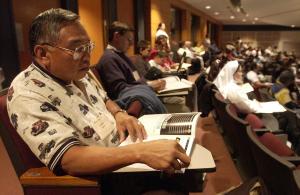Issue Date: July 4, 2003
By CATHOLIC NEWS SERVICE Speakers at a national meeting sponsored by the National Catholic Council for Hispanic Ministry urged more than 300 people involved in Hispanic ministry to advance the causes of Hispanic spirituality and education, and to examine ways Hispanics can contribute to their home parishes and on the national level. The May 22-25 meeting was held at the University of Notre Dame under the theme, “The Power to Serve.” The National Catholic Council for Hispanic Ministry is an umbrella group for 50 church-based organizations. In his keynote address May 23, Archbishop Roberto O. González of San Juan, Puerto Rico, said that Hispanic ministry in the United States needs to develop evangelization programs based on the strong links of faith to reason and experience. An evangelization based on moralism must give way to one that develops an inner lifestyle that enables individuals and communities to respond to the world around them from their faith convictions, he said. The archbishop recalled watching a Puerto Rico Day parade in New York with several other clergymen. One of the clergymen complained that the popular piety displayed by the Puerto Rican marchers meant nothing because they didn’t vote Catholic. González quoted the clergyman as saying: “They vote for pro-abortion, pro-contraception, pro-divorce, pro-gay politicians.” The archbishop said he disagreed with this “moralistic point of view.” People with this viewpoint “consider the Hispanic community as ‘lost’ to the cause of evangelization conceived entirely in moralistic terms,” he said. The archbishop described “authentic evangelization” as opening the heart to mercy. “From this perspective we are not lost yet,” he said. “Unfortunately, when evangelization finally became a central concern of the entire Catholic church in the United States, this interaction between faith and culture, between evangelization and the social, economic and political realms, was understood primarily in moral terms,” he said. “The morality in question may be conservative or liberal. The problem is not which of these two corresponds better to Catholic teaching,” he said. “The problem does not lie with the particular causes being promoted. The problem is that the influence of faith in culture is measured by moral righteousness.” Hispanic ministry must continue its concern for the urgent social needs of Hispanics such as poverty, discrimination and marginalization, González said. But “the time has come to turn our attention to the contributions that Hispanic Catholics can make to church and society in the United States,” he said. “One of the greatest contributions we can make to our culture is to show how the proposal in the public forum of insights originating in faith does not threaten religious liberty and pluralism,” he said. González also warned Hispanics against taking a triumphalistic attitude. “Frankly, sometimes the claims, the documents, the declarations made, give the impression that Hispanic Catholics leaders have a messianic complex, that everyone has to learn from us, that we are chosen as a people in a way different from others, as self-proclaimed saviors of American culture, seeking to replace it with a Hispanic one,” he said. “We are not saviors of anything,” he said. “It is a matter above all of giving together a humble witness in our work to these priorities generated by our faith,” he said. Clarissa Martínez de Castro, director of state and local advocacy policy for the National Council of La Raza, said Hispanics have become a valuable political commodity but cautioned against thinking of them only as a political or economic sector of society. The National Council of La Raza is a private, nonprofit organization providing support services for Hispanic community organizations. With some 37 million Latinos in the United States, according to the 2000 census, “Hispanics are energizing the economy,” said Martínez, a first-generation Mexican-American. “They are energizing the political process in this country. They are energizing the Catholic church,” she said. “But we have to begin to see that any agenda that addresses Latinos’ needs is an American agenda.” Citing a specific example of where Latino advocacy is needed, Martínez said Latinos have the highest school dropout rate of any identified group. “It’s a myth that Latino parents don’t care about the education of their kids. They just don’t realize how much of an advocate they have to be for their kids in the schools here, how involved the system expects them to be in order for their child to be successful,” she said. Martínez noted that President Bush’s No Child Left Behind Act “is putting the burden on the parents and the child for the child to succeed, without providing funding for assistance.” She added that the law puts additional pressure on schools to make immigrant students conform quickly to academic prescriptions, a pressure that may frustrate the student because he or she does not have the language skills, cultural knowledge and support system to rise to the occasion. “What we need of the Catholic church is to create the spaces that will foster understanding between Catholics of different cultures” and that will “help parents navigate the educational system,” Martínez said. Lionel Sosa, an advertising executive from Texas and media consultant for President Bush’s 2000 campaign, said Hispanics must engage both political parties in the struggle for effective political participation. Hispanics must tell the Democratic Party it cannot take the Hispanic vote for granted, said Sosa. Meanwhile, without Hispanic participation, the Republican Party will not change and develop in ways that serve Hispanic causes, he said. National Catholic Reporter, July 4, 2003 |
